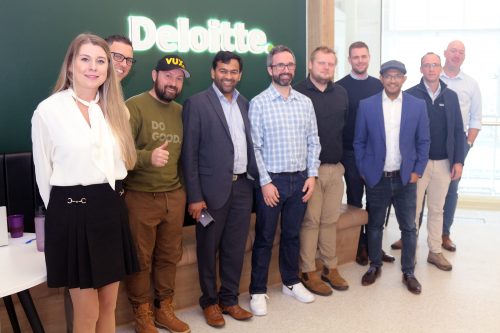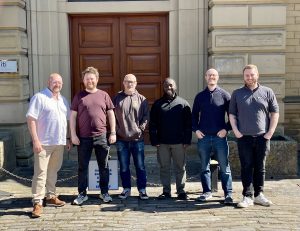Empowering efficiency: how AI can optimise business dynamics

Whether you love AI or hate it, few business can afford to ignore it.
TheBusinessDesk.com gathered some of the region’s leading AI experts to discuss the pros and cons of AI in business, including its impact on businesses and on job, and on the ethical use of the technology and what regulatory framework might be necessary in various sectors.
The AI round table was sponsored and hosted by Deloitte.
Adam Roney, futurist and owner of digital transformation agency Calls9, is a proponent of AI but sees the need for safeguards. “I don’t see it as a threat, I just see it as a massive opportunity, and it’s something we try to lead from the front on. We do software development, it does software development, so now we use it to accelerate our software development process. And we tell everyone they should be doing the same thing.
“We’ve got quite a bit of experience, because of my legal background and because of the clients we work with, of putting the safeguards on it. And it’s right to talk about those. The irony is that we like it because it’s really creative and we hate it because it’s really creative. There’s this tension between do the magic and stay in the box.”
Hannah Brately, of co-founder and chief executive of AI and digital training company Frame, said there was a bias against AI. “Humans make mistakes all the time, and people are like, ‘Fine.’ But when an AI does it, it’s not good enough. ‘Why is it not 100%?’”
Frame uses generative AI to increase its social media post, which has led to an uptick in sales inquiries as well as using it to support its tech team’s work. “One managed to debug his portal within 30 seconds using ChatGPT. I said, ‘That’s brilliant – but now I want you to spend the rest of the day learning how, why. I don’t want you to copy and paste in a massive bunch of code, I want you to upskill yourself at the same time.
“It certainly makes us more efficient, and everybody in the team uses it, but we have to be really careful with it.”
Leaders found many opportunities for using AI in their businesses.
Kane Simms, co-founder of customer experience specialists Vux World, said using AI to automate routine tasks left team members free to concentrate on more complex or high value interactions.
“It’s a case of helping give people time back,” he said. “We’ve all been in situations where we’ve been stuck on the same website for half an hour, waiting for a live chat agent to come back to us, or we’re on hold to our insurance company for 45 minutes.”
Andy Jack, founder of boutique training consultancy Candle Digital, used generative AI to boost learning. “We try and create transformative learning experiences that change people’s lives,” he said. “We’ve started looking at using generative AI to create conversations as a way of reinforcing certain concepts. There’s some very interesting stuff going on in that space. I’m an AI optimist – I think AI, if we’re up for it, has the opportunity to be a catalyst for change in education.”
Lalit Suryawanshi, co-founder and chief technology officer of ITECHO Health, warned, “If you’re putting your [AI generated] code into the wider world, you’re losing intellectual property, so a lot of companies now are building their own model – I’m working with a supplier who is building one for us.”
That was something Luke Budka, Ai strategist with creative and Comms agency Definition, recognised.
“Like a lot of creative agencies, back in November last year, we thought it was fantastic. And we quickly realised we would give away our data to foundation models for training purposes, so we decided we needed to build our own proprietary model so we could roll it out internally, which we’ve done.
“The conversations have moved from how do we build it, to not sounding like everyone else. How do we fine tune the model? How do we combined personalities from history so our CEO sounds more authoritative when the next set of quarterly results come out? We’ve just commissioned v2 of Definition AI, so I’m quite excited about it at the moment.”
Eric Applewhite, director of Analytics at Deloitte, said he was fascinated by the use of AI not only to drive human conversations, but also to work with code and data, such as by documenting legacy programmes and exploring whether it was all necessary.
“It’s a virtual virtuous circle, so I love that idea,” he said. “I worry and am excited about the human impact of AI – as jobs change and shift, and skills change and shift, how are we human about it. We’re trying to figure it out. This is not just a business question – it’s an existential question for us all.”
This is the first of two reports from the AI round table. The second focuses on AI regulation.









